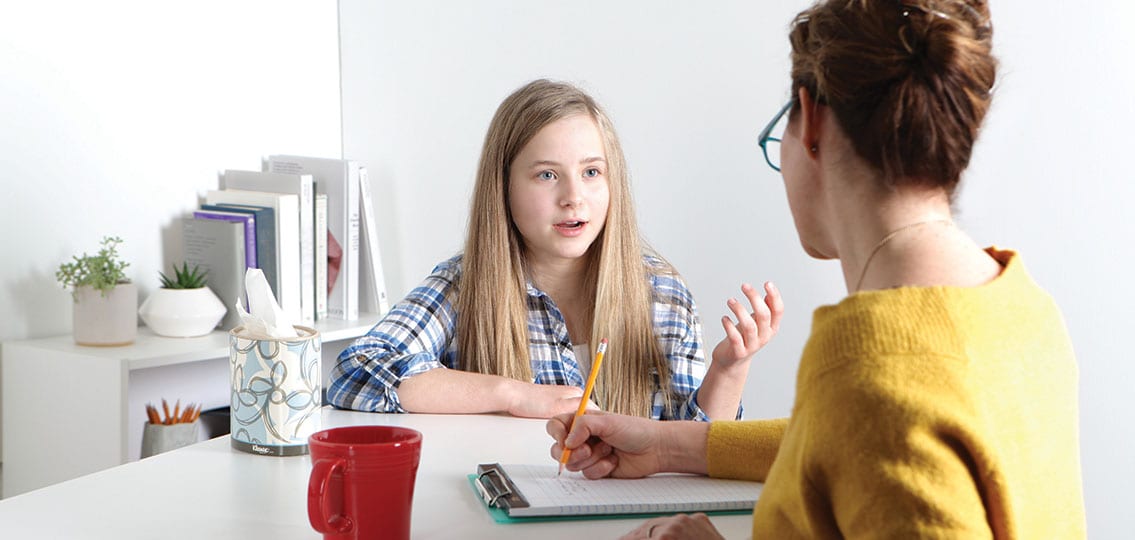Effective techniques used in Youth Counselling for emotional resilience
Exploring the Different Sorts Of Treatment Available for Teenagers With a Specialist for Teenagers
Teenagers face distinct difficulties that can affect their mental health and wellness. Numerous healing techniques are customized to resolve these concerns effectively. From Cognitive-Behavioral Treatment (CBT) to Art Treatment, each technique uses distinctive benefits. Recognizing these treatments can assist caregivers make informed choices. What aspects should be considered when choosing the appropriate method for a teenager? The exploration of these various therapies exposes understandings that can greatly boost adolescent well-being.
Comprehending Cognitive-Behavioral Treatment (CBT) for Teens
Cognitive-Behavioral Treatment (CBT) works as an effective device for attending to the distinct mental health and wellness challenges dealt with by teens. This evidence-based technique concentrates on the interplay in between actions, thoughts, and sensations, aiding teenagers recognize and transform negative idea patterns that contribute to their struggles. Via structured sessions, specialists lead teenagers in identifying their cognitive distortions, cultivating healthier coping systems and psychological guideline.
CBT is particularly efficient in taking care of anxiety, clinical depression, and behavioral problems, as it outfits teens with sensible abilities to navigate their lives. The treatment urges self-reflection and promotes an aggressive way of thinking, equipping adolescents to take control of their psychological health and wellness trip. By setting certain objectives and utilizing various strategies, such as journaling and role-playing, CBT promotes strength and self-awareness. On the whole, this healing approach gives teenagers with essential devices to challenge their challenges and build a much more favorable overview on life.
The Advantages of Dialectical Behavior Modification (DBT)
While numerous restorative strategies provide important insights for teenagers, Dialectical Behavior modification (DBT) attracts attention for its efficiency in addressing psychological guideline and interpersonal challenges. Developed by Dr. Marsha Linehan, DBT combines cognitive-behavioral techniques with mindfulness techniques, making it specifically suitable for teens grappling with intense emotions. This therapy helps teens identify and comprehend their sensations, promoting healthier reactions to stress factors.
One of the considerable benefits of DBT is its concentrate on structure skills in 4 crucial locations: mindfulness, interpersonal performance, distress resistance, and psychological regulation. These abilities encourage teenagers to cope and navigate intricate partnerships with tight spots a lot more properly. Additionally, DBT encourages a solid healing alliance in between the specialist and the adolescent, fostering trust fund and visibility. As a result, many teenagers experience improved emotional stability and improved coping systems, ultimately leading to an extra fulfilling life and more powerful relationships with peers and family.
Discovering Art Therapy as a Creative Outlet
Art therapy uses teenagers an one-of-a-kind method for self-expression and emotional exploration (Youth Counselling Near Me). With numerous techniques and approaches, it enables them to interact feelings that might be challenging to articulate verbally. By taking part in creative tasks, teenagers can experience healing benefits that promote mental health
Advantages of Art Treatment
Taking part in art therapy gives teens with an unique imaginative outlet that fosters psychological expression and individual insight. This restorative strategy permits adolescents to connect feelings and experiences that might be challenging to express vocally. With different types of imaginative expression, such as attracting, painting, or sculpting, teens can discover and refine complex feelings, causing raised self-awareness. Furthermore, art treatment promotes relaxation and tension alleviation, offering a risk-free room for people to launch bottled-up emotions. The non-judgmental atmosphere encourages testing, assisting teenagers build self-confidence in their creative thinking and analytic abilities. Consequently, art therapy can improve general mental wellness, providing a useful tool for handling life's difficulties during this critical developmental phase.
Approaches and methods
When exploring art treatment as a creative outlet, numerous strategies and methods can be utilized to assist in emotional expedition and expression. These might consist of drawing, collage-making, paint, and sculpting, allowing teenagers to communicate feelings that may be challenging to verbalize vocally. Guided images can also be made use of, urging individuals to visualize and create depictions of their feelings. In addition, the unification of songs or motion can improve the innovative process, cultivating a much deeper link to their internal experiences. Group art tasks supply possibilities for social communication and shared healing. Notably, the emphasis in art treatment lies out imaginative ability however on the procedure of development, empowering teens to discover their own special kinds of self-expression and understanding.
Art as Expression
Imagination functions as an effective avenue for self-expression, especially for teenagers navigating complex emotions. Art therapy offers an unique electrical outlet for teens to explore and interact feelings that might be difficult to verbalize vocally. Via drawing, paint, or sculpting, teens can envision their inner battles, promoting a feeling of understanding and launch. This therapeutic method permits for individual interpretation and urges exploration without judgment. Furthermore, taking part in imaginative activities can boost self-confidence and advertise psychological strength. As teens produce, they may discover brand-new perspectives on their difficulties, leading to recovery and individual development. Inevitably, art therapy acts as a necessary source, encouraging adolescents to navigate their emotional landscapes via innovative expression.
The Duty of Family Therapy in Teenager Mental Wellness

Advantages of Family Members Participation

Communication and Dispute Resolution
Effective interaction and dispute resolution are essential components of teen mental health and wellness, particularly within the context of family members treatment. Family treatment offers a structured atmosphere where teens can reveal their sensations and ideas, cultivating open discussion. This healing setup encourages member of the family to actively pay attention to each other, advertising understanding and empathy. By resolving conflicts in a safe room, adolescents learn beneficial skills for handling disputes constructively, which can lower psychological distress. Additionally, these skills improve family dynamics, causing healthier connections. As teenagers browse the intricacies of their emotions, family therapy equips them with devices to interact successfully, willpower disputes amicably, and strengthen familial bonds, ultimately sustaining their total mental wellness.
Using Mindfulness-Based Therapy for Tension Decrease
As adolescents navigate the complexities of adolescent life, including mindfulness-based therapy can act as a powerful tool for stress decrease. This restorative strategy highlights present-moment recognition, assisting teenagers face their thoughts and sensations without judgment. By exercising mindfulness techniques such as deep breathing, body scans, and directed imagery, teens can discover to manage stress and anxiety and tension better.
Study indicates that mindfulness-based therapy can improve emotional policy and resilience in teenagers, enabling them to deal far better click for more info with social challenges and academic pressures (Youth Therapist). Normal practice can lead to boosted focus, lowered impulsivity, and greater overall health. In addition, mindfulness promotes a feeling of connection to oneself, promoting self-compassion and minimizing adverse self-talk
Integrating mindfulness into therapy sessions uses teens practical methods they can use in day-to-day life, encouraging them to navigate stress factors with greater convenience and confidence. Because of this, mindfulness-based treatment ends up being a necessary resource in sustaining teen psychological health and wellness.
Incorporating Play Treatment for Younger Teens and Preteens

Therapists learnt this approach produce a risk-free setting where younger teens can discover their concerns and create dealing strategies. By taking part in play, these people can better comprehend their emotions and learn to navigate social communications. Additionally, play therapy can foster strength and analytical skills, vital for navigating the difficulties of adolescence. Overall, integrating play therapy can enhance the therapeutic process, giving more youthful teens and preteens with the tools they require to flourish mentally and socially.
Regularly Asked Inquiries

How Do I Know if My Teenager Requirements Therapy?
Indicators that a teen might need therapy include consistent sadness, modifications in behavior, withdrawal from close friends or tasks, scholastic decrease, enhanced stress and anxiety, compound use, or difficulty dealing with life adjustments. Observing these indications can trigger expert assessment.
What Qualifications Should I Try to find in a Teen Specialist?
When seeking a teen specialist, one should prioritize qualifications such as relevant degrees in psychology or therapy, state licensure, specialized training in teen issues, and experience dealing with teens in numerous restorative setups.
How Can I Assistance My Teenager Throughout Therapy?
To sustain a teen throughout treatment, one must actively pay attention, use motivation, respect their personal privacy, and validate their sensations. In addition, promoting open communication can aid them feel more comfy discussing their emotions and experiences.
What Prevail Indicators of Mental Health And Wellness Issues in Teens?
Usual indications of psychological wellness issues in teens consist of consistent unhappiness, withdrawal from good friends and tasks, adjustments in rest or appetite, trouble focusing, boosted irritability, drug abuse, and obvious decreases in academic efficiency or self-confidence. (Youth Counsellor)
How Much Time Does Therapy Generally Last for Teens?
Therapy duration for teenagers generally varies, commonly lasting from a couple of weeks to several months. Elements influencing this timeline include the individual's particular demands, the kind of therapy, and development made throughout sessions.
From Cognitive-Behavioral Therapy (CBT) to Art Therapy, each modality uses distinct advantages. Cognitive-Behavioral Treatment (CBT) offers as an effective device for dealing with the special mental health challenges encountered by teenagers. Involving in art therapy provides teenagers with an one-of-a-kind creative outlet that promotes psychological expression and personal insight. Family members original site therapy offers an organized setting where teens can express their thoughts and sensations, promoting open dialogue. Research shows that mindfulness-based therapy can enhance psychological policy and resilience in teens, enabling them to deal far better with academic stress and social challenges.